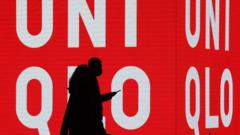Following Uniqlo's CEO Tadashi Yanai's statement about not using Xinjiang cotton, a movement for boycott intensifies on Chinese social media, reflecting the complexities of global business amid rising geopolitical tensions.
Uniqlo's Cotton Comments Ignite Backlash in China

Uniqlo's Cotton Comments Ignite Backlash in China
Uniqlo faces significant pushback on social media after its CEO's remarks about Xinjiang cotton during a BBC interview.
Uniqlo is encountering a considerable backlash from Chinese netizens after comments made by the CEO of its parent company, Fast Retailing, regarding cotton sourcing practices. In a recent BBC interview, Tadashi Yanai confirmed that Uniqlo does not source cotton from Xinjiang, a region embroiled in controversy due to allegations of forced labor involving the Uyghur Muslim minority. This remark, broadcast this week, prompted a wave of reactions on Chinese social media platforms, particularly Weibo, where users began calling for a boycott of the retailer.
The topic has garnered widespread attention, with hashtags such as "Controversy over Uniqlo founder’s remarks" trending among millions of users. Supporters of Xinjiang cotton have argued its quality, with phrases like "Xinjiang cotton is the best in the world" gaining traction. One post summed up the sentiment of many, stating that Uniqlo's "arrogance" would not dissuade consumers from standing firm in their boycott efforts.
During the interview, Yanai expressed concern about the political nature of discussing specific cotton sourcing, saying, "Actually, it gets too political if I say anymore so let's stop here." This statement underlines the delicate balancing act that global companies face when navigating sensitive political issues in China, a major market and manufacturing hub for Uniqlo.
China’s officials have repeatedly denied allegations of forced labor, which have been bolstered by findings from various organizations, including the U.S. government. This incident is reminiscent of past controversies involving other Western brands. H&M, for instance, faced significant backlash in China after refusing to use Xinjiang cotton, resulting in its products being removed from major e-commerce sites.
Uniqlo's comparatively neutral stance on the issue until now has kept it partially insulated from similar backlash, unlike brands such as Nike and Burberry which faced boycotts.
The situation highlights the ongoing challenges that global retailers encounter as geopolitical tensions rise, with China's Ministry of Commerce recently investigating PVH Corp., the parent company of Calvin Klein and Tommy Hilfiger, over allegations of unjustly boycotting Xinjiang cotton. As Uniqlo navigates the fallout from these comments, the broader implications for international business and consumer sentiment in China remain to be seen.

















